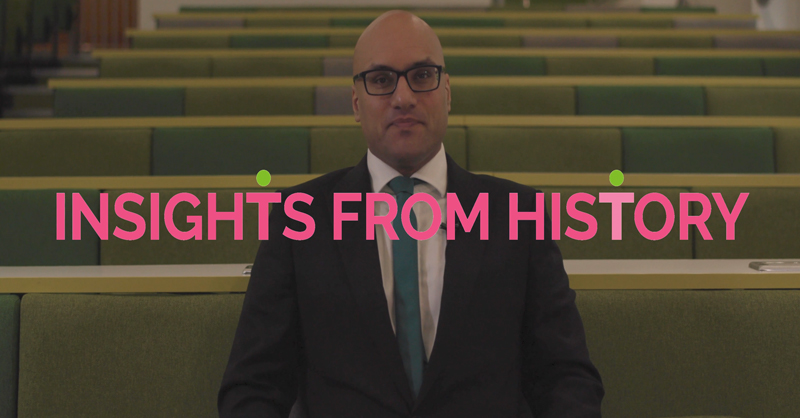Insights from history on the new industrial revolution

Principal Investigator:
Dr. Ahmad Beltagui – Aston University
Co-investigators:
Dr. Brian Sudlow – Aston University
Dr. Miying Yang – Cranfield University
Project Outline:
The aim of the project is to communicate actionable insights from social science research on technology adoption, by creating a repository of digital stories on historical industrial transitions. The project will expand the Insights from History series of animated digital stories that resulted from a systematic literature review.
The project will use historical precedents to identify actionable insights about the factors that matter for IDT adoption. It will focus on conveying these insights to SMEs in particular, drawing on strong institutional links with SMEs. Creating short, informative and accessible videos has the potential to communicate findings most clearly to SME leaders and contribute to the desired impacts on successful IDT adoption.
The valorisation of the PrOH Modelling Methodology for the human-centred digitization of the Rolls-Royce Aerospace plc extended enterprise

aapsky / Adobe Stock
Principal Investigator:
Professor Ben Clegg – Aston University
Co-investigators:
Dr. Krishna Balthu – Aston University
Dr. Ehsan Eslamian – Aston University
Project Outline:
This project will build on capabilities in systems thinking and action research developed at Aston University – specifically the PrOH modelling methodology – to increase its impact outside academia. PrOH modelling is a systems thinking action research approach used to understand complex organisational issues, stimulate innovative thinking to improve organisational issues and implement effective solutions.
PrOH modelling is a form of soft systems methodology specifically designed to affect change in organisational strategy, people, culture, technology and operations through a human centred approach. To date the PrOH modelling methodology has had in-depth success led by experts in small volume. This InterAct project is focused on commercialising the PrOH Modelling Methodology for training, teaching and practice, to achieve a more widespread use.
AI with Impact: A guide for CEOs

Jintana / Adobe Stock
Principal Investigator:
Dr. Viktor Dörfler – University of Strathclyde
Project Outline:
The project aims to help business leaders with getting AI implementations right, as an astonishingly high proportion of AI implementations (various sources put it between 50-80%) are either a failure or do not deliver the desired outcomes. Examining underlying reasons that are fundamentally human not technological, the project team hopes to correct unrealistic expectations towards AI resulting from the lack of understanding of what AI actually can and cannot deliver.
Project outputs will help improve AI implementation quality and thus increase investment in AI in the UK manufacturing sector. Dr. Dörfler seeks to assist manufacturing in learning from other sectors and vice versa through increased understanding of the variety of AI solutions. Helping smaller AI solution providers make suitable offers to large, established companies and indirectly help increase the international competitiveness of UK organisations.
Design and evaluation of a brochure outlining the toolkit for responsible and inclusive digital transformation

GoodIdeas / Adobe Stock
Principal Investigator:
Dr. Vladislav Grozev – University of Sheffield
Co-investigators:
Dr. Hui Zhang – University of Sheffield
Professor Carolyn Axtell – University of Sheffield
Professor Karina Nielsen – University of Sheffield
Project Outline:
The aim of this project is to produce an extensive brochure informing relevant stakeholders about the availability and purpose of a toolkit for responsible and inclusive digital transformation, including:
(1) A structured process for involving multidisciplinary teams across different departments and stakeholders at different levels of an organisation in responsible co-design
(2) Exercises for co-creating acceptable future scenarios for working with the digital change (including consideration of job design).
(3) A survey tool for measuring digital attitudes, and generating action plans to enhance trust and adoption of the change.
The toolkit contains guidelines for organisations in relation to the structured process (i.e., the five-stage process, principles of responsible design/stakeholder involvement, guidance on potential action plans) – as well as provide guidelines for how to use the specific tools (scenarios tool and digital attitudes tool). Overall, the toolkit will help organisations action the insights gained from research on responsible innovation and socio-technical change.
Disseminating insights regarding the management and governance of Open Innovation projects for IDT providers

Tinnakorn / Adobe Stock
Principal Investigator:
Dr. Andrei Gurca – Queens University Belfast
Co-investigator:
Dr. Kate Broadhurst – Loughborough University
Project Outline:
As the complexity of IDT development projects increases and numerous, highly interdependent elements, components and subsystems interact to deliver functionality, many firms lack the knowledge and capabilities to complete their projects independently. Therefore, firms are increasingly engaging in purposeful, collaborative efforts with different business partners (i.e., open innovation) at various stages of their complex projects. The benefits of opening up to business partners include access to valuable external resources, risk sharing, reduced costs, and improved time-to-market.
The project aims to engage business leaders and representative bodies and organisations like the Chamber of Commerce, Local Enterprise Partnerships in the creation of their actionable insights through a series of workshops targeted at demystifying the processes of open innovation for businesses and policymakers. Further materials will be made available via the InterAct resource repository and at additional events in 2024.
FASHTRAX: Knowledge Exchange Platform

fotoinfot / Adobe Stock
Principal Investigator:
Dr. Hilde Heim – Manchester Fashion Institute, Manchester Metropolitan University
Co-investigator:
Julie Hodson – Manchester Fashion Institute, Manchester Metropolitan University
Project Outline:
Researchers from the Manchester Fashion Institute’s Textiles Transparency Team (MFITT) are seeking to create an online knowledge exchange platform called FASHTRAX. The platform aims to be an industry facing, fashion transparency innovation exchange site for the dissemination of Manchester Fashion Institute’s research and innovations in the field of digitalising supply chain transparency.
The project is responding to findings that garment manufacturers are seeking guidance on how to adopt and integrate digital technologies in a non-disruptive way into their existing operations. The current fundamental lack of transparency and visibility throughout the various stages of the supply chain is one of the most significant barriers preventing organisations from implementing more sustainable, accountable practices.
The FASHTRAX knowledge exchange platform will signpost several emerging technology providers, such as those offering blockchain, AI, and sensors – that digitalise the supply chain’s key processes in addition to research on implementation to help organisations achieve these aims.
An interactive online tool for prioritising verification, validation and testing activities to support human decision-making

Rymden / Adobe Stock
Principal Investigator:
Dr. Khadija Tahera – The Open University
Project Outline:
The development of new digital technology needs extensive verification, validation and testing (VV&T). An effective way of analysing the requirements of different stakeholders, i.e., the customer’s voice, regulations and business’s voice and how these requirements must be considered in the VV&T planning for new technology, is significantly challenging.
This project aims to develop a systematic method of analysing critical requirements and influences on the VV&T activity for new technology development and manufacturing, which will support the adoption of digital technologies and facilitate collaboration between SMEs and larger companies.
Dr. Tahera will be developing a tool designed to help manufacturers and SMEs map customer and regulatory requirements to technical requirements and VV&T activities, and prioritise VV&T activities based on risk and importance. The tool will provide actionable insights that will help manufacturers make informed decisions about testing, potentially saving time and costs in VV&T planning and decision-making.
Using the Reflective Goal Setting Model to accelerate the adoption of digital technologies by enhancing digital readiness in UK manufacturing

Mdisk / Adobe Stock
Principal Investigator:
Dr. Cheryl Travers – Loughborough University
Co-investigators:
Dr. Elaine Conway – Loughborough University
Sandra Huskinson – Coventry University
Project Outline:
Leaders’ personal and interpersonal skills and the ability to set goals are increasingly in demand due to the impact they can have on organisational success and employee performance, motivation, and wellbeing. The manufacturing sector is no exception. However, development of these skills often falls far short of expectations, with poor transfer of learning post-training. Traditional goal setting approaches have limited effectiveness in the development and utilisation of ‘softer’ yet crucial leadership and management interpersonal skills
The key purpose of this project is to take the established and evidence-based model of Reflective Goal Setting (RGS) and to develop actionable insights in the form of a toolkit, an animated video, and a discovery phase blueprint for an RGS app – specifically to facilitate the successful adoption of, and adaptation to, digital technologies. The project will explore the potential barriers to adoption that may result from a potential lack of suitable and relevant skills, lack of and/or prior experience, limiting mindsets, worry and anxiety, and unsuitable behaviours.
Enabling Digital Transformation for SMEs: an Industry 4.0 Open Innovation Platform

Looker_Studio / Adobe Stock
Principal Investigator:
Professor Beverly Wagner – University of Strathclyde
Co-investigator:
Dr. Natalie McDougall – University of Strathclyde
Project Outline:
The unprecedented changes of increasing digitalisation in parallel with the challenges organisations face in adoption and implementation of Industry 4.0 are the driving forces behind this project. There is a need to enable collaboration and co-creation to drive digital transformation.
New requirements related to customer experience and needs alongside value and efficiency improvements necessitate digital transformation. This can be enabled via adoption and implementation of Industry 4.0 technologies, such as big data analytics, blockchain, Internet of Things, intelligent products, sensors, robotics, adaptive manufacturing, and many others. However, whilst this is becoming an imperative for organisations, SMEs may be hindered by a lack of resources and capabilities.
The project team will develop a platform using virtual collaborative sharing tools, which will be accessible via an Open Innovation webpage. Key insights taken from the longitudinal study of Open Innovation adoption and Knowledge Transfer Partnership on Open Innovation practices will shape an interactive toolkit comprising the following:
- A best practice guide to aid the business community select an appropriate open innovation business model and understand the process and requirements at each level for ideation through to commercialisation.
- Case studies presented by key stakeholder organisations that detail factors that influence open innovation implementation and technological uptake.
- Methodologies of Industry 4.0 adoption from keynote industry speakers.
- Collaborative tools, activities, and co-creation spaces to support the development of relevant capabilities adoption and implementation of Industry 4.0 technologies.

